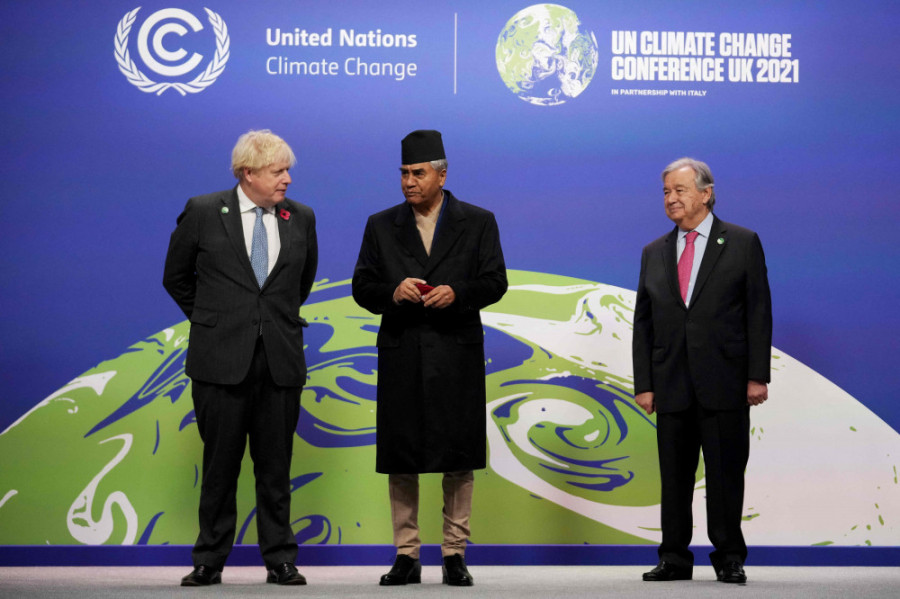Greta Thunberg, the student activist who galvanized a global movement that is challenging world leaders to do more on climate change, summarized the UN climate conference held in Glasgow over the first weeks of November as “blah blah blah.”
But if any country could have made her proud, it would have been Nepal.
In a statement at the conference, Prime Minister Sher Bahadur Deuba, who also led Nepal’s delegation to the summit, made three bold commitments.
First, he noted that “Nepal aims to reach a net zero emissions by 2045.” This would mean that by 2045, Nepal would not emit more greenhouse gas than it saved (i.e., net zero). Second, he committed that 15 percent of our total energy demand would be supplied from clean energy sources. Third, he committed to “maintain 45 percent of our country under forest cover by 2030.”
Some of these commitments are, however, conditional on Nepal securing adequate climate financing.
The prime minister’s commitments went beyond what Nepal had previously outlined in its second submission of National Determined Contributions to the UN last December.
His commitments got a mixed reaction. Donors and development partners welcomed it as pathbreaking. Nepali professionals who work in the sector welcomed it cautiously, pointing out that the true test would be in implementation. For the broader Nepali public, there were other things to worry about—the state of the judiciary, for example.

The commitments were surprising. Maybe not to those who helped write the PM’s speech. But for many, it was a stunning announcement—one that defied expectations and invited cynicism.
The surprising—though bold—announcement raises an important question of how much ownership the country really has of its plan. Over the past few years, there has been an effort to broaden Nepal’s climate discourse to a wider range of stakeholders. But it hasn’t gone far enough.
Plans and bold announcements—the prime minister’s commitments being a recent good example—often represent the narrow views shared only by those who write the speeches. The reason that implementation of the plans then fail isn’t always because Nepal lacks the capacity or the finance. Rather it is because those tasked with implementing the plan have never even heard of it.
Whether PM Deuba’s climate commitments were backed by consensus and planning at home or represented two minutes of glory on the international stage, is perhaps irrelevant.
Nepal needs big, bold, and immediate action on climate. As the prime minister noted in his speech, “around 80 percent of Nepal’s population is at risk from natural and climate-induced hazards. During the last 40 years, natural disasters have caused close to US$ 6 billion physical and economic damages in my country alone.”
And that estimate is probably a gross under-count. With a fragile geology, vulnerable population, and an economy highly dependent on weather, Nepal is at the frontlines of climate change with much to lose.
Also read: Opinion | Nepal’s electric addiction
For Nepal, investments on climate mitigation and adaptation are ideal to build the basis of economic growth, reduce poverty and enhance resilience. Nepal’s recent submission on nationally determined contributions and the prime minister’s speech at Glasgow both highlighted its intent on instituting approaches that leave no one behind.
Nepal’s policies must align with that goal and its commitments. Many of its current policies disproportionately favor the rich and exacerbate climate vulnerabilities of the poor.
On energy, for example, Nepal has committed to ensuring that 5-10 percent of its power generation capacity comes from mini- and micro-hydro power, solar, wind and bio-energy renewable energy plants (where renewable energy is defined as less than 1 MW). However, Nepal’s energy policies are marginalizing such plants. Hundreds of small such plants are decaying and being left to die as supply from large hydro-plants grows.
On transport, which is another important source of fossil fuel use and energy imports, the government has announced ambitious plans to promote electric vehicle use. But a wrong mix of tax incentives is enabling the rich to adopt electric vehicles while distracting from the need to invest in electric public transport and accessible individual transport for the poor (such as electric bicycles).
The prime minister’s COP26 commitments on climate should be welcomed. But Nepal must also ensure that its policies and investments equally serve the poor and offers a base for stronger, inclusive and resilient economic growth.











